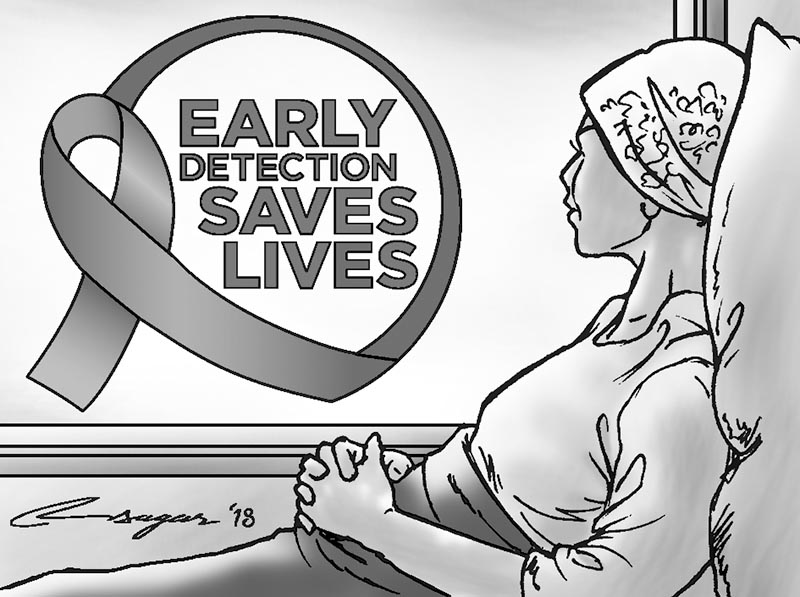Cancer awareness: Early diagnosis can save lives
While there is a need to step up efforts by government and other agencies to make people aware about the fact that early diagnosis of cancer can save lives, the state should work on better equipping the existing cancer hospitals
Recently, a 25-year-old male underwent a peripheral blood examination. The results were within normal limit. But while digging deeper into his health history, it was found that he was diagnosed with blood cancer (acute lymphoid leukaemia) some 15 years ago. But with treatment, it had become asymptomatic and the man was leading a normal quality life.
This shows there is an answer to cancer. Almost all cancers originate from a single cell and have genetic pathology, which arises because of DNA (deoxyribonucleic acid) alteration due to exposure to carcinogens or faulty DNA behaviour. Cancer is an uncontrolled growth of specific lineage of cells which can deposit in other parts of body like liver, bones, lungs and brain through blood, lymphatic channels or body fluids. Carcinogens are the risk factors. Tobacco, alcohol and some fertilizers are carcinogens. Exposure to these risk factors is avoidable, which means cancer is preventable.
Similarly, like the old adage goes “a stitch in time saves nine”, early diagnosis of cancer can save lives. Strong suspicion and diagnostic approach to the disease always results in correct and timely diagnosis, which can help in precise and effective treatment.
On February 4, World Cancer Day was observed in Nepal. The Day is observed globally to raise awareness about this non-communicable disease. This year, World Cancer Day was observed with the theme “We can. I Can.” The theme implies concerted efforts at the individual as well as collective levels are a must to reduce cancer burden.
According to the World Health Organisation (WHO), cancer is one of the leading causes of morbidity and mortality worldwide. The number of new cases is expected to rise by about 70 per cent over the next two decades. Cancer is the second leading cause of death globally, and was responsible for 8.8 million deaths in 2015. Globally, nearly one in six deaths is due to cancer. Approximately 70 per cent of deaths from cancer occur in low- and middle-income countries.
Number of cancer patients in Nepal has been rising in recent years. According to the Ministry of Health, 6,178 new cancer patients were receiving treatment in hospitals across the country in the fiscal year 2016-17.
In Nepal, cervical, breast and lung cancers are common among people. Avoiding risk factors and periodic health check-ups are the best ways to prevent cancer. Risk factors are of two types — modifiable and non-modifiable. Cigarette smoking, tobacco chewing, alcohol consumption, smoked meat, morbid obesity, heavy metal exposure, radiation exposure, immunosuppressive drugs are called modifiable risk factors. Exposure to these can be minimised to nil or can be controlled. However, non-modifiable factors such as age, gender, family history, anatomical anomaly of organs are beyond our control.
Various studies support that the practice of Pap smear examination of cervix will help in diagnosis of precancerous and early stage cancer. This is the reason the number of cervical cancer patients has significantly declined in the western world in recent years. Usually early stage of cancer doesn’t exhibit symptoms. But on examination and regular check-ups, many of them can be diagnosed. Early detection of cancer means such patients can be completely cured. People who are exposed to risk factors or are bearing risk factors should be made aware about the possibility of the disease and should go for regular check-ups.
Generally unexplained significant weight loss, unexplained bleeding, recently appeared swelling in body and pain can be the presenting complaints. One has to regularly examine the body for any palpable swelling and abnormal secretions from body orifices.
Some tests that are useful for cancer screening include self examination of body/FNAC/biopsy (for all visible swelling to rule out cancer); Pap smear test (for cervical cancer); peripheral blood smear (for blood cancer); USG of various body parts (for abdominal and visceral cancer); complete skin examination (for mole changing its nature towards malignancy); prostate specific antigen (for prostate cancer); endoscopic examination (for gastrointestinal, nasopharyngeal cancer); and chest X-ray (for lung cancer). FNAC/biopsy is a test done by pathologists to know the nature of the disease examining the cell/tissue. There is a need to raise awareness among people about visiting the doctors for regular check-ups. Apart from the tests mentioned above, CT/MRI scan can also be performed. If a patient visits the hospital and is diagnosed with cancer limited to the primary site, chances of cure are very high. It’s high time the country started allocating enough budget for treating non-communicable chronic diseases. The government as well as non-government agencies need to step up efforts to make people aware about the fact that early diagnosis of cancer can save lives.
The government also needs to work towards establishing super specialty hospitals with the oncology department in each province. Already existing cancer hospitals need to be equipped with human resources and technical resources. The government also should start investing in research and studies so as to reduce cancer burden.
Bastakoti is an oncopathologist at BP Koirala Memorial Cancer Hospital






